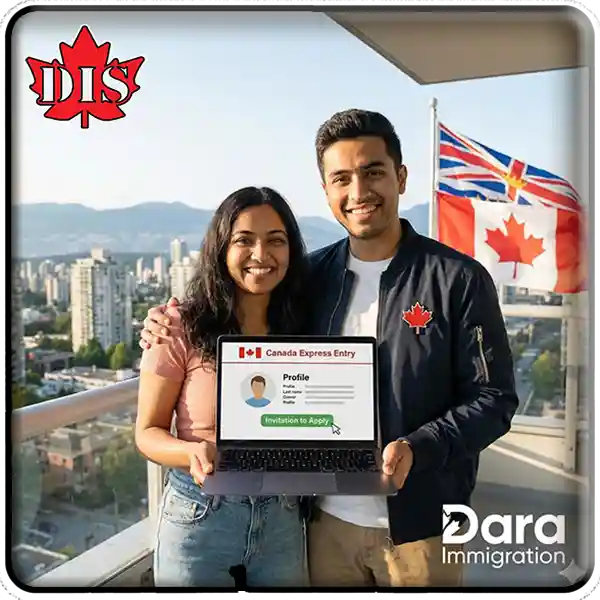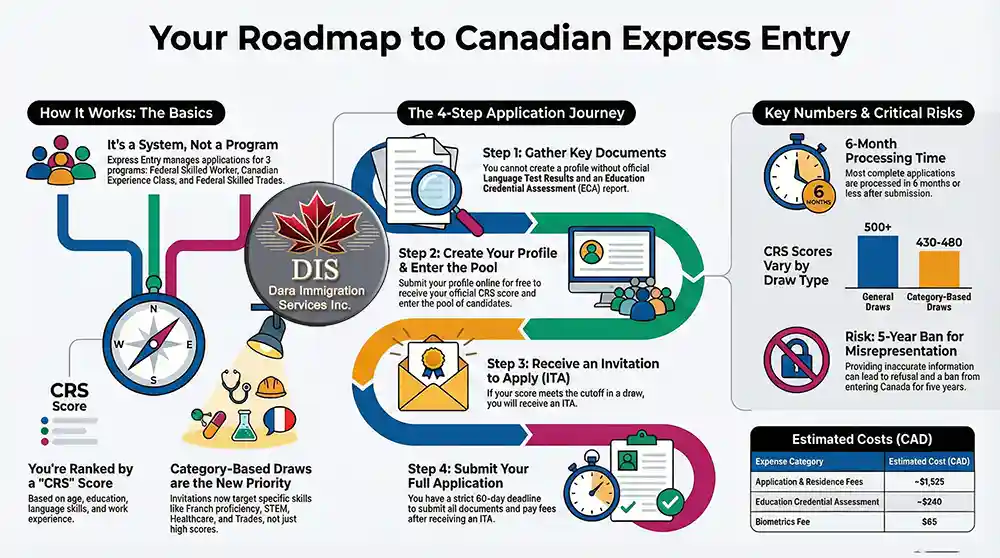Canadian Express Entry
Canadian Express Entry Overview 2026-2027
Canadian Express Entry is the gold standard for global migration, offering the fastest and most popular pathway to Permanent Residence for skilled workers worldwide. For hundreds of thousands of applicants, this digital selection system is the doorway to a life defined by safety, stability, and economic freedom.

However, the “Express” in the name can be misleading. While the processing is fast, the competition is fierce. In 2026, simply entering the pool is no longer enough; you need a strategic Comprehensive Ranking System (CRS) score and a profile optimized for Category-Based Selection (e.g., French speakers, STEM, Healthcare) to receive an Invitation to Apply (ITA).
At Dara Immigration Services, we turn complex point calculations into a winning strategy. Whether you are a software engineer in Bangalore or a plumber in Dublin, this guide is your roadmap to navigating the Canadian Express Entry system successfully.
Key Takeaways (Quick Summary):
- Not a Program: Express Entry is a management system for three federal programs (FSW, CEC, FST).
- Category-Based Draws: IRCC now prioritizes candidates with specific skills (French, Healthcare, STEM, Trades, Transport, Agriculture) over just high scores.
- The “CRS” Score: You are ranked against others based on Age, Education, Language (CLB), and Experience.
- Processing Time: Most complete applications are processed in 6 months or less.
How Does the Canadian Express Entry Work?
Canadian Express Entry is the online system used by Immigration, Refugees, and Citizenship Canada (IRCC) to manage applications for three federal economic immigration programs.
The Three Streams of Canadian Express Entry
To enter the pool, you must first qualify for one of these streams:
- Federal Skilled Worker (FSW): For workers with foreign experience. Requires 67/100 points on the selection grid.
- Canadian Experience Class (CEC): For workers who have at least 1 year of skilled work experience inside Canada.
- Federal Skilled Trades (FST): For qualified tradespeople (e.g., electricians, chefs) with a job offer or certification.
Category-Based Selection in Canadian Express Entry
IRCC no longer just invites the highest scores. They now hold specific rounds of invitations for candidates with experience in:
- French-Language Proficiency (The biggest advantage in 2026).
- Healthcare Occupations.
- STEM Occupations (Science, Tech, Engineering, Math).
- Trade Occupations.
- Transport & Agriculture.
Canadian Express Entry Eligibility Requirements
To successfully create a Canadian Express Entry profile, you must have your documents ready. This is not a “sign up and wait” system; it is a data-driven competition.
1. Language Proficiency (The “CLB” Factor)
You must prove your language skills in English and/or French.
- Test: CELPIP-General, IELTS-General, or PTE Core (English); TEF Canada or TCF Canada (French).
- Requirement: Minimum CLB 7 for FSW/CEC (though CLB 9 is often needed to be competitive).
- Tip: French proficiency can add up to 50 bonus points to your CRS score.
2. Education Credential Assessment (ECA)
If your degree was earned outside Canada, it means nothing to the system until it is assessed.
- Action: You must get an ECA Report from a designated organization (e.g., WES, ICAS, CES) to prove your foreign degree is equivalent to a Canadian one.
3. Skilled Work Experience (TEER Categories)
Your work experience must fall under TEER 0, 1, 2, or 3 of the National Occupational Classification (NOC).
- Proof: You will need reference letters from employers detailing your duties, hours, and salary.
4. Settlement Funds (Proof of Means)
Unless you are applying under CEC or have a valid job offer, you must prove you have enough money to settle in Canada.
- 2026 Estimate: Approx. $15,143 CAD for a single applicant (increases with family size).
Costs, CRS Scores & Timelines (2026 Estimates)
Note: CRS cut-off scores fluctuate with every draw. Category-based draws typically have lower score requirements than General draws.
| Category | Fee / Metric | Notes |
| Processing Fee | $950 CAD | Payable after receiving an ITA. |
| Right of Permanent Residence Fee | $575 CAD | Payable before approval (Total ~$1,525). |
| Biometrics Fee | $85 CAD | Required once every 10 years. |
| ECA Report Cost | ~$240 CAD | Paid to WES/ICAS/CES directly. |
| Processing Time | 5 – 8 Months | For 80% of applications. |
| Typical CRS Score (General) | 500 – 540+ | Extremely competitive. |
| Typical CRS Score (French/STEM) | 430 – 480+ | Significantly lower threshold. |
Step-by-Step Application Process
Creating a Canadian Express Entry profile is free, but applying for Permanent Residence is by invitation only.
Step 1: Document Gathering (Pre-Profile)
Do not start until you have your Language Test Results and ECA Report number. You cannot create a valid profile without them.
Step 2: Create Your Profile
Log in to your GCKey account and answer questions about your skills, education, language, and family.
- Result: You will receive a CRS Score and be placed in the “Pool of Candidates.”
Step 3: Wait for the ITA (Invitation to Apply)
IRCC holds draws (usually every 2 weeks). If your score meets the cut-off for that round (General or Category-Based), you receive an ITA.
Step 4: The 60-Day Deadline
Once you get an ITA, you have exactly 60 days to submit your full application (eAPR).
- Action: Upload police certificates, medical exams, proof of funds, and employment letters.
Step 5: Submission and AOR
Pay your government fees and submit. You will receive an Acknowledgement of Receipt (AOR). This “locks in” your age and status.
Canadian Express Entry Risks and Refusals
The Canadian Express Entry system is unforgiving. A small error can lead to a refusal or a ban.
1. Misrepresentation (The 5-Year Ban)
If you guess your work dates or exaggerate your job title, IRCC calls this Misrepresentation.
- Consequence: Your application is refused, and you are banned from entering Canada for 5 years. Always be 100% accurate.
2. The “Incomplete” Application (R10 Check)
If you upload a police certificate that is missing a page, or a photo that is blurry, your application will be rejected as “Incomplete” (cancelled) within weeks. You lose your processing fee and your spot in the queue.
3. Declining CRS Score
Your age points drop by 5 points every single birthday (after age 29). If your birthday passes while you are in the pool, your score drops, potentially putting you below the cut-off.
- Strategy: [Link to: Book a Consultation] to maximize your score before your next birthday.
Frequently Asked Questions (FAQ)
- What is a good CRS score in 2026?
For “General” draws, a score above 510 is often required. However, for “Category-Based” draws (e.g., Healthcare, French), scores as low as 440–480 can be successful.
- Can I apply without a job offer?
Yes! The vast majority of Canadian Express Entry candidates do not have a job offer. If you have high education and language skills, you can be invited based on your human capital alone.
- Does my spouse’s score matter?
Yes. If your spouse is accompanying you, their language skills and education can add (or subtract) points from your total. Sometimes it is strategic to list the spouse as “non-accompanying” initially to boost the score.
- How long does the profile stay active?
Your profile remains in the pool for 12 months. If you are not invited within a year, the profile expires, and you must create a new one.
- Can I update my profile after submitting it?
Yes. You can (and should) update your profile with new language test results, new work experience, or a new degree to increase your CRS score while you wait in the pool.

Professional Immigration Assistance
Canadian Express Entry is a race, not a queue. With millions of profiles in the pool, only the most optimized applications receive that life-changing “Invitation to Apply.”
Don’t leave your CRS score to chance. Contact Dara Immigration Services today for a comprehensive profile review and let us secure your place in Canada.
Disclaimer: This article provides general information regarding Canadian Express Entry and does not constitute legal advice. Policies and CRS cut-offs change frequently.
Download:
Download the bulletin of Canadian Express Entry as a PDF.
Download “Canadian-Express-Entry-Bulletin-2026-2027.pdf” Canadian-Express-Entry-Bulletin-2026-2027.pdf – Downloaded 31 times – 1.66 MB